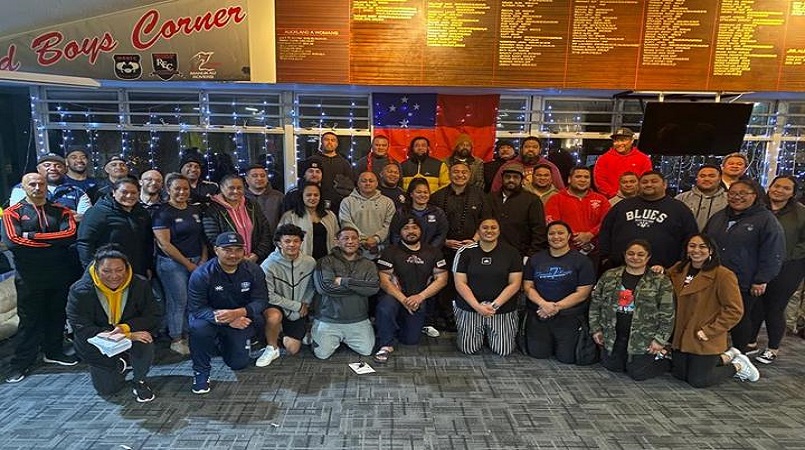
For the first time in history, New Zealand's Rugby Smart programme is being delivered in Te Reo Māori and Pacific languages, to encourage more Māori and Pasifika coaches to the field.
The first course was held at the Manukau Rovers Rugby Football Club in Māngere Auckland last week, with the compulsory injury prevention workshop translated into Samoan and Tongan.
Central region delivery lead of Auckland Rugby, Tidah Leaupepe, is on a mission to remove any barriers that might be holding back Pasifika people from taking up opportunities both on and off the field.
"A lot of them don't come to our Rugby Smart [courses] because language is a barrier," she said.
"That's an easy barrier to fix and so I just went about contacting my resources across Auckland and Counties Manukau, just to see who would be available to speak in their language and to deliver a Rugby Smart course in Māori and Pasifika languages."
"For me, our solutions lie within the community and it's not until you address those with them, that they provide you with the feedback... we need to connect with those at grassroots and provide solutions for them to attend or participate in the workshops that we're running. We need to help build their dreams and help those dreams become a reality."
Over 45 people took part on the night with Auckland's Pasifika rugby community prepared to tackle the language barriers together.
New Zealand Rugby's Pasifika Engagement Manager, Saveatama Eroni Clarke, welcomed those who attended, acknowledging the breakthrough event for the Pasifika community who do so much for the game.
A number of former internationals including former Manusina player, Ala Bakulich- Leavasa, and former Black Fern, Doris Taufateau, were among those who helped deliver the course in their mother tongue.
Leaupepe said there's already been requests to hold more.
"They loved it and they wanted more, and then from this there were conversations that turned to 'How do I become a facilitator? How can I help you do more for our community? How do I go down the coaching pathway? Can we have more Pasifika engagement initiatives such as these and how can we help you to drive them?'
"I don't know if there's been any other environment that's been created like that where we felt united and we just felt like more of a community in our own sense and everyone coming together, it just meant so much to me and I know it meant a lot to everyone else as well."
There was a good uptake from female participants as well, she added.
"We had eleven facilitators and of those eleven, we had 7 that were female. A lot of the participants and attendees who came along to the course were really taken back by how much they'd taken in from the females facilitating the course, so I was really impressed with how they responded to our female facilitators."
"It's a growing opportunity and development opportunity for everyone, for both female and males, as well as our community and our Pacific and Māori spaces."
Ako Wāhine Rugby Educator, Caroline Matamua, was one of the Tongan facilitators at the course.
The former head coach of the women's 'Heilala o Tonga' said it was a celebration of Pasifika contribution and champions that push and pull for Pacific peoples in the rugby space.
"It's historical and it shows that's there's intentional care for its sport development," she said.
"But also for the people that participate in the sport, they recognize, they can see the people that are important, their contribution to the sport and their safety, so for me I was personally really happy to see that development and I wish other codes would follow."
Matamua helped translate New Zealand's rugby code book into the Tongan language which was distributed to coaches on the night.
She said the course was different to mainstream courses because it felt like everyone was on even pars to learn.
"This course was really special because you're coming together in the vā or you know in the space, and the relationship between Pacific men and women are different, especially when we speak the language, so when we were doing the modules and trading in our own language, we were a lot more mindful."
"It was a special feeling to speak about safety in your own language and you know keep in mind, there's words there that we had to create because there was no Tongan translation for words like concussion, but it was very special. It was good to see the men and women interact and it was just a different space."
While Maori and Pasifika players are dominating the rugby field, Leaupepe, who's been with Auckland Rugby for three years, said the goal is to create more opportunities and better representation of Pasifika people across all levels of the game, with the course planned to also be delivered in Niuean, Cook Island and Te Reo Māori.
